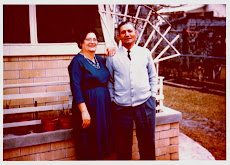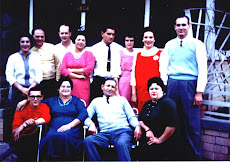
It would be wrong to celebrate Father's Day on this blog without a nod to the Soljan family's paterfamilias.
Mato Soljan's story was the classic immigrant's tale -- one of hard work and endurance with its share of tragedy.
Mato Soljan's story was the classic immigrant's tale -- one of hard work and endurance with its share of tragedy.
Unlike my nona, who largely grew up in the heart of her family in Biloxi, my grandfather came here alone as a young adult. He never saw his family or native land again.
A second son, Mato shouldered the responsibilities of supporting his family when his older brother entered the priesthood.
Like many young men on Hvar, he was a fisherman and occasional deck hand/galley help on merchant ships. He served his brother as an altar boy in the parish church.
A second son, Mato shouldered the responsibilities of supporting his family when his older brother entered the priesthood.
Like many young men on Hvar, he was a fisherman and occasional deck hand/galley help on merchant ships. He served his brother as an altar boy in the parish church.
Dalmatia, in the year of my grandfather's birth, was part of the Austrian empire. With all of Europe filled with economic and political instability after the first world war, he began looking abroad for a brighter future. Waves of Croats left home during this time to build new lives in the Americas, Australia and New Zealand.
Mato and a shipmate planned to jump from their merchant ship when it pulled into port in New York. Another crew member ratted them out, and the captain threw them into the ship's brig. Their next opportunity was Galveston, Texas. Knowing they were under surveillance, they jumped overboard a few miles out and swam to shore using the lighthouse as their guide.
According to Mato's immigration papers, this was in December 1921. The water was cold. Mato, just turned 23, was not a strong swimmer. The currents off Galveston can be strong. Still they made it.
He spent a year or so in Galveston washing dishes, bussing tables and helping out in kitchens to make ends meet. He taught himself English by reading newspapers and captions at the movies (silent in those days). He practiced his new language with a Japanese friend from the restaurant.
Biloxi, Mississippi, at this time was known as the Seafood Capitol of the World. It was home to a thriving Croatian community. Jobs on the shrimp boats and in the factories were plentiful. His friend who had jumped ship with him had family there, including a widowed cousin willing to let rooms in her house to new Croatian immigrants from good families.
Mato and a shipmate planned to jump from their merchant ship when it pulled into port in New York. Another crew member ratted them out, and the captain threw them into the ship's brig. Their next opportunity was Galveston, Texas. Knowing they were under surveillance, they jumped overboard a few miles out and swam to shore using the lighthouse as their guide.
According to Mato's immigration papers, this was in December 1921. The water was cold. Mato, just turned 23, was not a strong swimmer. The currents off Galveston can be strong. Still they made it.
He spent a year or so in Galveston washing dishes, bussing tables and helping out in kitchens to make ends meet. He taught himself English by reading newspapers and captions at the movies (silent in those days). He practiced his new language with a Japanese friend from the restaurant.
Biloxi, Mississippi, at this time was known as the Seafood Capitol of the World. It was home to a thriving Croatian community. Jobs on the shrimp boats and in the factories were plentiful. His friend who had jumped ship with him had family there, including a widowed cousin willing to let rooms in her house to new Croatian immigrants from good families.
And so "Mike," as Mato was now known, went to Biloxi. He let a room from his friend's cousin and worked in the shrimp fleet. He continued to save his money with the dream of bringing his mother and youngest siblings to America.
He was never able to realize this dream. His mother died. His siblings drifted into lives of their own. He continued to send money home.
He was never able to realize this dream. His mother died. His siblings drifted into lives of their own. He continued to send money home.
Mike married his landlady's daughter. Together they brought seven children into the world. They buried their oldest son, Mato Jr., before his third birthday. They built a house on the Point. It washed out from under Mike during the hurricane of 1947 as he tried vainly to sandbag it against the surge.
He rebuilt the house himself. And nearly lost it again 22 years later when Camille roared ashore. By now, he was over 70.
Grandpa was a jack of all trades who never fully retired. Into his 60s, he continued part-time work on the shrimp boats. Occasionally he still cooked on the merchant ships. When shrimp season was bad, he moonlighted as a security guard at Keesler Air Force Base. During the Depression, he and Nona operated a bakery. He learned to make and mend shoes, earning him the nickname "Shoemaker Mike."
If America turned out not to be the land of milk and honey as he once believed, Grandpa never complained. He became a U.S. citizen and was proud of it. He presented his 20 grandchildren with dollar bills for buying ice cream, candy, sodas and sno-balls, unaffordable luxuries during his own childhood. He always spoke English with a heavy Croatian accent -- and a baffling Japanese lilt.
His only indulgences were a private stash of Hershey's kisses hidden in his sock drawer and the ever-present pack of unfiltered cigarettes in his shirt pockets. The latter eventually killed him.
He must have known he was dying, but he never let on. The cancer, spreading from his lungs to his brain, told the family for him. By then, he only had weeks to live. His affairs were already in order.
His life may not have been perfect, nor were those of his children and grandchildren. We've all known our share of heartbreak and hard times, but nothing compared to what our lives could have been like had Grandpa been made of less sturdy stuff.
I'm sure that if he were still here, he'd say that he'd do it all over again. And I am grateful to him.
The following is a "boat" recipe that made it ashore to the family kitchen. Nearly all the shrimpers had one like it. It's one of those stick to your ribs one-pot meals. And it's colorful and tasty. The classic recipe calls for a can of tomatoes (as do most Croatian recipes), but I like it just as well without.
Pig's Ass and Cabbage (aka Boat Cabbage)
1 medium head cabbage, chopped into chunks
1-2 onions chopped
2-5 cloves of garlic (depends on your taste for garlic)
l can tomatoes (small or large or you can omit this altogether)
1-2 lbs of picnic ham, cut in large pieces
4 -5 Irish potatoes, peeled and cut in chunks
4-5 sweet potatoes, peeled and cut in chunks
Salt and pepper to taste
Water to cover
In a large pot, layer the ingredients (cabbage, onions, garlic, ham, potatoes) repeating until all are used. Sprinkle with salt and pepper. Add tomatoes (if desired) and water to just under the top layer of cabbage. Cover and cook over medium-low heat until cabbage and potatoes are done, about 1 1/2 - 2 hours. Shake the spot to stir so as not to disturb the layers.
Photo: Grandpa, Mato "Mike" Soljan, in the 1950s


No comments:
Post a Comment